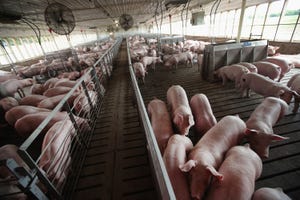Settlement agreement reached on Question 3 pork rules
The Massachusetts Attorney General's Office will not enforce the transshipment portion of the pork rules while MDAR completes its rulemaking process.

The Restaurant Law Center, four state restaurant associations and the National Pork Producers Council have reached an agreement with the Massachusetts Attorney General's Office and the Massachusetts Department of Agricultural Resources on two technical clarifications regarding Question 3 pork rules.
Under the terms of the settlement the pork rules would not apply to whole pork meat that is already in the supply chain as of Aug. 23. Also, the rules would not apply to whole pork meat that goes to distribution centers in Massachusetts, but is ultimately destined for restaurants in another state, even if a sale occurs in Massachusetts as part of the supply chain. Additionally, the Attorney General's Office has agreed not to enforce the transshipment portion of the pork rules while MDAR completes its rulemaking process.
"This settlement is a significant, positive outcome for restaurant operators, pork producers, the Restaurant Law Center, and for consumers in Massachusetts and its surrounding states, because it gives restaurant owners and their suppliers the time they need to avoid significant supply disruptions so they don't disappoint diners," said Angelo I. Amador, executive director of the Restaurant Law Center. "We appreciate the Attorney General's willingness to work with us on a settlement that will make it easier for operators and pork producers to make the required transitions in the supply chain and for distributors not to have to change their processes for surrounding states."
Passed by Massachusetts voters on Nov. 8, 2016, Question 3 imposes confinement requirements on out-of-state pork producers and prohibits the sale of pork meat within the state from offspring of an animal confined in a manner inconsistent with the state’s requirements, regardless of where in the nation the animal was raised.
The law was first set to be enforced on Aug. 15, 2022; however, before that date, an agreement was reached between the Office of the Massachusetts Attorney General and a coalition led by NPPC, that the law should "be put on hold at least until 30 days after the U.S. Supreme Court issues a ruling" in the California Proposition 12 lawsuit brought by NPPC and the American Farm Bureau Federation. Following the SCOTUS decision, the law was set to go into effect on July 12, but was recently granted an extended stay on implementation until Aug. 23.
While Question 3 is similar to Prop 12—banning any uncooked whole pork meat sold in the state that does not meet specific sow housing requirements, regardless of where it was produced—Question 3 goes further, not allowing the transshipment of whole pork through the state. According to NPPC, this would jeopardize an estimated $2 billion worth of pork that moves through Massachusetts into neighboring New England states.
Amador says the transshipment issue was the only legal matter in the Massachusetts pork rules that was not addressed by the recent U.S. Supreme Court decision on Prop 12.
"Regardless of whether some sellers could have complied with the requirements and some consumers support the spirit of the pork rules, the precedent of allowing a state to pick products that can be sold or consumed in another state would have had staggering national implications for the supply chain. These barriers to trade based on unique value judgments would have fragmented and hindered the growth of the national economy," said Amador.
The plaintiffs and defendants have now asked a federal judge to approve the settlement agreement. The agreement would end a lawsuit filed by the Massachusetts Restaurant Association, HospitalityMaine, New Hampshire Lodging & Restaurant Association, Rhode Island Hospitality Association, the Restaurant Law Center, and NPPC that challenged enforcement guidelines and the underlying 2016 law defining the conditions under which eggs, veal and pork sold in the Commonwealth must be farmed.
About the Author(s)
You May Also Like





